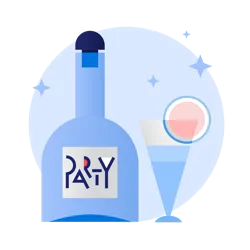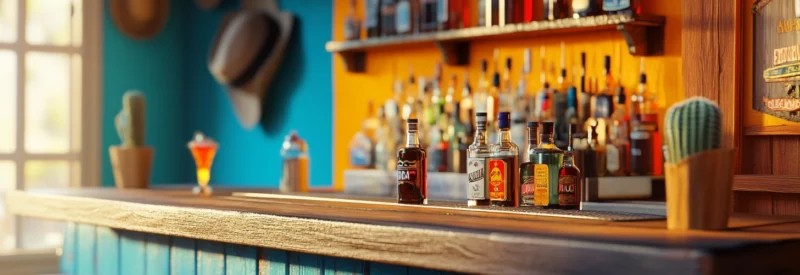Many businesses depend on liquor licenses to generate revenue. The alcohol industry alone is responsible for more than 4.4 million jobs in the US economy.[1] Four Loko. “Alcohol Beverage Industry Economic Impact“. Accessed September 13, 2024. However, alcohol is a heavily regulated product — all states, including Texas, have their own regulation requirements for businesses and organizations supplying alcohol. To sell alcohol in Texas, your business must have a liquor license.
So, how do you get a liquor license in Texas? This guide explores the requirements, the alcohol license cost, and everything else you need to know how to get your liquor license in Texas. Read ahead if you want to sell alcohol at a store, restaurant, bar, or any other establishment in Texas!
Types of Texas Liquor Licenses

There’s no one-size-fits-all liquor license for businesses and organizations in Texas. Instead, there’s a long list of licenses and permits, varying based on business types, alcohol type, and other factors. It’s critical to apply for a liquor license specific to your business’s alcohol-related activities. Below, let’s explore some of the most popular liquor license options in Texas:
- Mixed Beverage Permit (MB): Allows the sale of wine, malt beverages, and distilled spirits for on-premise consumption.
- Wine and Malt Beverage Retailer’s Permit (BG): Allows the sale of wine and malt beverages for both off-premise and on-premise consumption.
- Retail Dealer’s On-Premise License (BE): Allows a business to sell malt beverages for on-premise consumption.
Other alcohol licenses and permits available in Texas
- Wine and Malt Beverage Retailer’s Off-Premise Permit (BQ)
- Retail Dealer’s Off-Premise License (BF)
- Private Club Registration Permit (N)
- Private Club Malt Beverage and Wine Permit (NB)
- Private Club Exemption Certificate (NE)
- Package Store Permit (P)
- Wine-Only Package Store Permit (Q)
- Passenger Transportation Permit (TR)
- Brewer’s License (BW)
- Winery Permit (G)
- Distiller’s and Rectifier’s Permit (D)
- Out-of-State Winery Direct Shipper’s Permit (DS)
- Nonresident Brewer’s License (BN)
- Nonresident Seller’s Permit (S)
- General Distributor’s License (BB)
- Branch Distributor’s License (BC)
- Wholesaler’s Permit (W)
- General Class B Wholesaler’s Permit (X)
- Nonprofit Entity Temporary Event Permit (NT)
- Consumer Delivery Permit (CD)
- Bonded Warehouse Permit (J/JD)
- Manufacturer’s Agent’s Warehousing Permit (AW)
- Carrier’s Permit (C)
- Promotional Permit (PR)
- Third-Party Local Cartage Permit (ET)

What type of liquor license do I need?
The type of liquor license you require in Texas will depend on your business type, the type of alcohol you’re selling, and other factors. For example, if you want to sell spirits, beer, and wine to customers for on-premise consumption, you require a Mixed Beverage Permit (MB). However, if you’re opening a niche alcohol business, such as a brewery or a winery, you will need the licenses specific to those business types (Brewer’s License (BW) or Winery Permit (G)).
Liquor License Requirements for Texas
The requirements for a liquor license vary depending on the license you apply for. However, there are a few baseline requirements to be aware of — let’s explore them below:
- A legally registered business
- Your alcohol industry tier (there’s information on the TABC website to help you determine which tier is right for your business type)
- Your business’s address and contact details
- The business’s key people (this includes name, ownership percentage, social security number, etc.)
- Details about the business’s premises (such as its ownership or details about the lease)
- Projected sales information
- Investment and finance details
This is just the information for the initial application. Depending on your license type, there may be further requirements.

Other necessary permits
Depending on your business type, there are other specific alcohol licenses required by state authorities. For example, if your business wants to sell alcohol between midnight and 2:00 AM, you must apply for a Late Hours Certificate (LH). Likewise, if your business is a restaurant and wants to sell alcohol, it must also apply for a Food and Beverage Certificate (FB).
Some local authorities may also require other businesses licenses and permits to operate a company. Make sure to check with your local business regulator to determine if you need to apply for additional permits.
Understanding Liquor Laws in Texas
Liquor laws in Texas vary significantly depending on the local jurisdiction. For example, some areas do not permit the sale of alcohol at all.
Standard Liquor Laws in Texas
- No alcohol can be sold to anyone under the age of 21.
- An individual must be 18 or over to serve alcohol.
- No alcohol can be sold to someone who is clearly intoxicated.
- Grocery stores and convenience stores can sell beer and wine from 7:00 AM to 12:00 AM, Monday through Friday, and from 7:00 AM Saturday morning to 1:00 AM on Sundays.
- Grocery stores and convenience stores can sell beer from 10:00 AM on Sundays.
- Liquor stores can open from 10:00 AM to 9:00 PM from Monday to Saturday.
- Liquor stores cannot open on Sundays.
- For restaurants, you must have a Food and Beverage Certificate (FB) to sell alcohol at your establishment. This also requires alcohol sales to be 60% or less of total sales.
How Much Does a Liquor License Cost in Texas?
A liquor license’s cost varies significantly depending on the permit your business requires. Fees are subject to change, so make sure to keep tabs on the TABC website for the latest Texas liquor license costs.
Most popular liquor licenses in Texas (two-year fees)
- Mixed Beverage Permit (MB): $5,300 for the original license and $2,650 for renewal
- Wine and Malt Beverage Retailer’s Permit (BG): $1,900
- Retail Dealer’s On-Premise License (BE): $1,100
- Wine and Malt Beverage Retailer’s Off-Premise Permit (BQ): $1,900
- Retail Dealer’s Off-Premise License (BF): $1,100
- Private Club Registration Permit (N): $2,600
- Private Club Malt Beverage and Wine Permit (NB): $1,900
- Private Club Exemption Certificate (NE): $0
- Package Store Permit (P): $1,800
- Wine-Only Package Store Permit (Q): $1,600
- Brewer’s License (BW): $3,000
- Winery Permit (G): $3,000
- Distiller’s and Rectifier’s Permit (D): $3,000
- Out-of-State Winery Direct Shipper’s Permit (DS): $500
- Nonresident Brewer’s License (BN): $1,500
- Nonresident Seller’s Permit (S): $1,800
- General Distributor’s License (BB): $3,500
- Branch Distributor’s License (BC): $1,500
- Wholesaler’s Permit (W): $4,000
- General Class B Wholesaler’s Permit (X): $3,500
- Nonprofit Entity Temporary Event Permit (NT): $50 per day (up to 10 consecutive days)
- Consumer Delivery Permit (CD): $10,000
- Bonded Warehouse Permit (J/JD): $900
- Manufacturer’s Agent’s Warehousing Permit (AW): $1,900
- Carrier’s Permit (C): $1,100
- Promotional Permit (PR): $1,200
- Third-Party Local Cartage Permit (ET): $600
How to Apply for a Liquor License in Texas
Texas has an online application portal, simplifying the process of obtaining a liquor license for your business or organization. The Alcohol Industry Management System (AIMS) is a central location for applying for applications, managing permits, and more. Once you register your business with the Texas Secretary of State, you can sign up for an AIMS account to begin the application process. Below, let’s explore the step-by-step process for applying for a liquor license in Texas:
- Log into your AIMS account.
- Select the alcohol industry tier applicable to your business.
- Obtain the required signs for your premises.
- Follow the steps on the AIMS application portal; this will include submitting the details outlined in the “Liquor License Requirements for Texas” section of this guide.
- Obtain the required certifications, such as the public notice, publisher’s affidavit, and the certifications required by local authorities, such as county and city authorities.
- Continue checking your AIMS account to see if the TABC requests any additional documentation or clarification.
Lastly, you can also send a paper application if you don’t want to use AIMS. However, the TABC warns that paper applications take “considerably longer” to process, so this isn’t a good idea if you’re in a hurry.
How to Renew Your Texas Liquor License
Fortunately, it’s easy to renew a Texas liquor license before it reaches its expiration date. Once it’s 30 days before the license expires, you can log into your Alcohol Industry Management System (AIMS) account on the TABC website and begin a renewal application. If you fail to renew your license by its expiration date, you can still apply for another 30 days, but you must pay a late filing fee. Likewise, you cannot sell alcohol if your liquor license is expired (unless you have already submitted a renewal application).
Unfortunately, if you do not renew your Texas liquor license within 30 days of its expiration date, you will no longer be eligible to renew it. To begin selling alcohol again, you submit a new application altogether. For more information on renewing liquor licenses in Texas, head to the TABC renewal page here.
Getting a Beer and Wine License in Texas: Closing Thoughts

A liquor license can be the key to success for your new business. With more than 13.9 million residents over the age of 21 in Texas, there’s a huge market available to alcohol-related businesses in the state.[2]. “Texas Demographic Statistics“. Accessed September 13, 2024. Using the details outlined in this guide, start the application process to ensure you don’t delay the start of your new venture. Likewise, check the AIMS system routinely to stay up to date on your application status and respond to any requests for additional information.
However, with Texas issuing around 100,000 liquor licenses and permits each year, it’s a competitive market to enter.[3]Texas Alcoholic Beverage Commission. “TABC Licenses and Permits.”Accessed September 13, 2023. To separate your business from the competition, it’s critical to have an industry-leading payment processor to keep transaction costs low when you accept payments. Fortunately, bar and restaurant credit card processors offer access to industry-specific tools, a dedicated merchant account, and more! Contact us today to find out what we can do for your business!
FAQs
How long does it take to get a liquor license in Texas?
The length of time for liquor license approval varies on a case-by-case basis, but it may take up to 50 days to receive approval from TABC. However, many licenses are issued within 30-35 days. Make sure to keep tabs on your AIMS account to respond to any queries from TABC authorities. Not responding to requests for further documents or clarification may result in delays to your application’s approval. Not responding for ten days will result in the removal of your application.
Do you need a liquor license to sell beer or wine in Texas?
Yes, you must have the correct alcohol license or permit if you want to sell beer or wine in Texas. For example, you may need the Wine and Malt Beverage Retailer’s Permit (BG). The license your business requires will vary depending on the setting, business type, and other factors. Make sure to clarify which license is appropriate for your business before lodging an application.
Is it hard to get a liquor license in Texas?
It’s not particularly challenging to obtain a liquor license in Texas if you submit the correct documentation and uphold the requirements for liquor licensing in the state. However, it can take up to 50 days for approval, so it’s critical to submit an application well before opening a new business.
How long does a Texas liquor license last?
Most Texas liquor licenses last for two years after issuance — businesses must pay for the two-year license upfront. The TABC notifies license holders prior to expiration, but it’s best to keep tabs on your expiration date to ensure you lodge a renewal application in the renewal period (the 30 days leading up to the expiration date). However, there are also temporary event liquor licenses that last for less time. These temporary licenses are for organizations that provide alcohol for only a short period of time, such as a charity event. To check when your license expires, log into your AIMS account.
How do I get a temporary or one-day liquor license in Texas?
If you require a one-day liquor license in Texas, you must apply for a temporary event liquor license. This type of license is suitable for a business or organization with a short-term requirement for a liquor license. The type of license and the license cost will vary depending on your organization, how much alcohol you plan to sell, and other factors. You can find all the details you need and the application links on the TABC website here. It’s best to start the application process as soon as possible, as late filing fees are applicable if you don’t submit an application at least ten days before your event.




